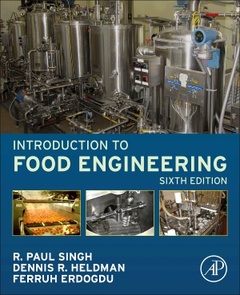Description
Introduction to Food Engineering (6th Ed.)
Food Science and Technology Series
Authors: Singh R. Paul, Heldman Dennis R., Erdogdu Ferruh
Language: English
Subjects for Introduction to Food Engineering:
131.23 €
In Print (Delivery period: 14 days).
Add to cart900 p. · 19x23.4 cm · Paperback
Description
/li>Contents
/li>Biography
/li>Comment
/li>
The sixth edition of Introduction to Food Engineering, with revised and updated content, aims to enhance the learning of quantitative approaches to designing food processing operations. The book, translated into six languages, is widely acclaimed in teaching and learning food engineering by many generations of students worldwide. It is notable for blending engineering principles based on fundamental physics applied to commonly used and emerging food processing technologies. The chapters are written to facilitate the instructors in presenting lectures in an organized sequence for effective teaching. Numerous solved examples, detailed steps, and end-of-chapter problems of industrial relevance are included to help students learn underlying concepts and their applications. Many illustrations, with companion web-based animations, aim to improve the subject's comprehension. A new chapter introduces quantitative aspects of cleaning and sanitation in food operations to enhance food safety. Quantitative aspects of emerging electrotechnologies for food processing are explained. Spreadsheet-based problem-solving techniques are included for designing unit operations with ?what-if analysis. Practicing professionals in the industry will find an extensive collection of reference data helpful in the design and operation of industrial food processes.
1. Introduction 2. Fluid Flow in Food Processing 3. Resource Sustainability 4. Heat Transfer in Food Processing 5. Preservation Processes 6. Refrigeration 7. Food Freezing 8. Evaporation 9. Psychrometrics 10. Mass Transfer 11. Membrane Separation 12. Dehydration 13. Supplemental Processes 14. Extrusion Processes for Foods 15. Packaging Concepts 16. Cleaning and Sanitation Operations
Dennis R. Heldman is the Dale A. Seiberling Endowed Professor of Food Engineering at Ohio State University. He is also an Adjunct Professor at the University of California-Davis and Professor Emeritus at the University of Missouri. He has been author or co-author of over 150 research projects and several books. He served as President of the Institute of Food Technologists in 2006-07, and was recognized with the Food Engineering Lifetime Achievement Award from the International Association for Engineering and Food in 2011.
Ferruh Erdogdu is currently Professor of Food Process Engineering at Ankara University in Ankara, Turkey. Erdogdu is a member of the ISEKI Academy and professional member of IFT. He is co-author of Virtual Experiments in Food Processing with Dr. Paul Singh, editor of the Optimization in Food Engineering, and author or co-author of more than 100 research papers.
- Numerical examples are reworked using the latest data on fluid properties obtained from the National Institute of Standards and Technology
- Quantitative examples describe the use of earth-friendly refrigerants in the cold chain
- Design procedures relevant to emerging electrotechnologies in food processing
- New content on resource sustainability for designing future food processing systems that support circular bioeconomy
- Description of quantitative approaches to food processing to assist practicing professionals in the food industry




